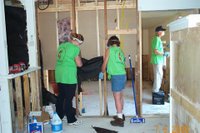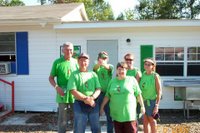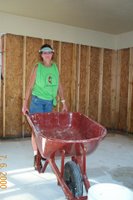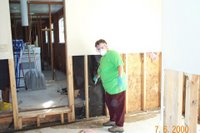





This is still the week we were staying in Gulfport and working in Pascagoula. We worked on a Day care Center owned by a private owner, but was where a lot of Exxon employees left their kids. It was closer to the Gulf and so had more damage. The owner and her family lived across the street from the center and the home was ruined on the inside and out as well. We had a big discussion as to whether it could be saved or needed to be torn down and build a new one. It was decided to save it, that is what was left and rebuild from there. We weren't sure if could be done, but guess what it was. Why am I wearing a mask, you may ask? Not because I was the masked cleaner or anything like that. No the Black Mold which is very dangerous was already showing and growing. That's why we had to be very careful, and use clorox to clean with. This owner was so grateful, she thought she was going to have fix the day care and their home. God is good and so was Exxon.
I've been reading articles about the problem of PTSD among the survivors of the hurricane. There was a study done by Harvard and is being reported in the news. Here it is from the Washington Post; In the six months after Hurricane Katrina, the rate of serious mental illness among the storm's survivors doubled, an unusual study has found, but the number of people contemplating suicide did not budge. Most survivors, in fact, said they had found a new sense of purpose, strength and community through coping with the disaster.
Overall, the researchers found a "pervasive optimism" among hurricane survivors on the question of whether they expected to be able to rebuild their lives. Emotional resilience was as high -- and by some measures, higher -- among low-income blacks, a group that suffered some of the worst deprivations, as in the survivor population as a whole.
Nevertheless, six months after the storm, many people were still short of money, housing, security and employment. The researchers are not certain the generally encouraging psychological state of Katrina survivors will endure.
"Optimism only lasts so long," said Ronald C. Kessler, the psychologist at Harvard Medical School who heads the study. "How long? We know from survivors of other hurricanes that after about 18 months people start to wear out."
The finding seems to conflict with reports that New Orleans' suicide rate tripled. But in an event such as Katrina, the vast majority of those who may have contemplated suicide may be less likely to act on it because they realize they are part of something bigger. Conversely, those with suicidal thoughts who don't have others with whom to share the disaster experience may be more inclined to kill themselves. So the findings are not inherently inconsistent, Kessler says.
Kessler says the absence of suicidal thinking reflects a newfound faith in the ability to start over. But he added that "optimism only goes on for so long" after a devastating event.
Psychiatrist Eugenio Rothe of the University of Miami's Jackson Memorial Hospital, who wasn't involved in the study, says there's reason to worry. "We did a study in Miami after Hurricane Andrew," he says. "The first year, people were busy getting through the day, rebuilding, getting their lives back in order.
"Then it hits them how much they've lost. They start mourning their losses."
The people who have these terrible experiences — they're often the ones who have these epiphanies," said Ronald Kessler, a Harvard University researcher who led the survey.
This capacity to grow from catastrophe may be an ancient survival mechanism that evolved to help humans live through frequent disasters, researchers suspect. It is sometimes called post-traumatic growth: External disasters may shake us, but also make us unwilling to give up — as in the resolve people feel in wartime.
It's also unclear if the apparent protective effect against suicide will be permanent. If survivors eventually lose hope in the recovery, they might become more susceptible to giving up, researchers suspect.
"There may be a crash-and-burn experience ... months down the road," cautioned Alan Green, a Johns Hopkins University counselor who treated survivors and knew of the survey findings.
But Kessler, a professor of health care policy at Harvard Medical School, said the number of people reporting a desire to kill themselves declined, in part because many survivors had forged stronger ties with loved ones and their community.
"We found an extraordinarily high proportion of our sample who said that despite the understandable sadness with all they lost and the understandable anxieties about the future ... that they felt closer to their loved ones, they felt connected to the community in a way they didn't before," he said.
"They felt much more religious, they felt that they had a purpose in their life and a meaning," he said, noting that 88.5 percent of the survivors in the survey said Katrina had helped them develop a deeper sense of meaning or purpose in life.
"Those are the people where these suicidal tendencies decreased," he said.
This is a message hope for all people. I like what the last paragraph has to say that they had forged stronger ties with loved ones and their community. They felt closer to their loved ones. They felt more religious and had a purpose and meaning in their life. I pray this continues for them, that they don't crash and burn and lose hope and faith. I pray that we keep praying for them lifting them up, supporting them with our time and talents and money. I pray they experience the presence of God in their lives, their marriages, families and communities. But it may be that they become a witness to us, and we learn from them.
2 comments:
First, thanks for sharing your pictures over the past few posts.
But I have to say I'm dubious about the pervasive optimism named in the survey, after being there. Of course we hope and pray that there will be healing, but we also need to let people's sadness run its course and not expect them to be "all better" like children whose boo-boos have been kissed. (I'm not saying you're doing that!)
the community thing really resonates with me. i think this connectedness is something we all crave--no, we all *need*. it's in our dna, so to speak. i just hate that it's a disaster and suffering that brings that out. i join your prayer. blessings.
Post a Comment